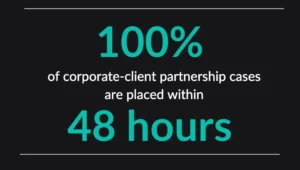While pro bono is typically a priority at law firms, it is traditionally a low priority for tech investment since firms can view it as non-generating. Accordingly, Paladin is often asked by law firm business development teams about the ROI of pro bono innovation outside of the core pro bono function. In other words: what is the full scope “business case” for pro bono technology?
Now that we have dozens of firms and corporate teams using Paladin, we’re in a good position to answer! Our clients find that pro bono technology doesn’t just increase access to justice, but also boosts time savings, recruitment, retention, marketing, and more. Check out a few real-world case studies on interdepartmental ROI below:
1. Professional Development
Firms spend upwards of $12,000 USD annually per associate on training and professional development when they could be leveraging pro bono to help attorneys develop real world skills relevant to their billable work for free. Paladin tags the experience level and skills acquired on each opportunity to make real life skill-building easier than ever, and captures data around how attorneys are developing.

KPIs to measure: Skills acquired, new areas of law practiced, incorporation in performance reviews
2. Business Development
Nearly 2% of firm revenue is reinvested in marketing and business development. Yet, pro bono can be a source for developing business relationships, and firms on Paladin have gained new books of business from corporate clients through pro bono collaboration. When firms and corporates can seamlessly share opportunities, track relationships, and report on joint projects more effectively through technology, the business tie is stronger.

KPIs to measure: increased client engagement, new billable matters from client, hours/outcomes by client, stories and testimonials
3. Retention and Morale
The annual cost of attrition can be up to 4x an attorney’s salary. Providing a strong pro bono offering can be an effective way to improve retention and morale since research shows that employees who engage in corporate volunteering tend to score much higher on employee happiness and engagement surveys. Take it from our users:
I am beyond impressed with the obvious amount of care and thought that went into Paladin’s design. Not only is the site incredibly user-friendly, but it also has a key functionality: it helps users match up their interests and availability with a wide variety of different pro bono opportunities. I used Paladin to immediately take on a new pro bono matter, and will be watching for new and exciting pro bono opportunities as they appear on the website.April W. Partner, AmLaw50
Paladin has been exceptionally easy to navigate and a very practical way to connect with pro bono opportunities. Since our firm launched the platform, the process of identifying a new pro bono matter streamlined what would have been several emails, phone calls, delays, and discussions, to just a couple of clicks, reducing the administrative burden associated with taking on pro bono matters significantly.Dana D. Partner, AmLaw100
KPIs to measure: employee satisfaction and retention
4. Marketing and Branding
Sharing pro bono success stories and key wins is important for boosting visibility, engaging with clients, and inspiring others to work with you. With technology that boosts engagement and frees up time for high leverage work, your firm is in a better position for external wins like our below clients:
- Wilson Sonsini Receives 2021 Pro Bono Award from Iranian American Bar Association
- McDermott Will & Emery Recognized for Outstanding Commitment to the Community by Legal Services of Greater Miami
- New York City Bar Justice Center Announces Winston & Strawn as 2020 Outstanding Pro Bono Service Award Winner
KPIs to measure: number of stories collected, social media reach, press /awards
5. Recruiting
About 74% of recent law school graduates cite the opportunity to give back as an important criteria in choosing an employer. As top law schools ramp up pro bono culture, firms that support graduates in continuing their community involvement have a competitive advantage.
According to The Bar Examiner, “giving back” ranks higher among those seeking a law degree versus those considering other higher education degrees. Being an advocate for “social change” ranked higher as well for law students, which aligns with a majority of pro bono initiatives.
6. Publicly Supporting Access to Justice Innovation
This list wouldn’t be complete without recognizing that by joining other innovative leaders in the legal field committed to increasing pro bono engagement, firms can double down on their commitment to access to justice and solidify their roles as pro bono thought leaders. Plus, with more time freed up from administration, pro bono teams can focus on what matters: having more impact.
“Paladin is a great example of where the law is going. As one of the first firms to work with Paladin, we wanted to accelerate our pro bono efforts by digitizing the way these matters are administered. Paladin has exceeded our expectations in helping us maximize the impact of our access to justice efforts."David Wang Chief Innovation Officer, Wilson Sonsini




